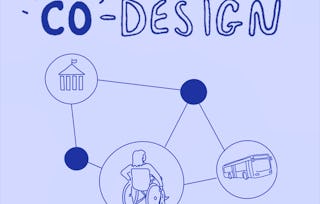Improving our society starts by improving today’s Higher Education. Promoting more attractive and innovative learning and teaching approaches. Challenge-based learning (CBL) is one of those approaches. It’s an innovative learning methodology focused on applying students’ knowledge to solve real-world challenges. It is also an excellent approach to develop creativity, entrepreneurial competences, interdisciplinary and self-regulated learning skills.

Co-creation and challenge-based learning in Higher Education
6 days left! Gain next-level skills with Coursera Plus for $199 (regularly $399). Save now.

Co-creation and challenge-based learning in Higher Education



Instructors: David Rodríguez Gómez
Included with
(13 reviews)
Skills you'll gain
Details to know

Add to your LinkedIn profile
4 assignments
See how employees at top companies are mastering in-demand skills

There are 4 modules in this course
The introduction sets out the main characteristics and contents of the course with special emphasis on the importance of the two main contents:<br>1) The fundamentals of Entrepreneurial education and Challenge-based learning;<br>2) the main characteristics of the ATOM Model created for promoting entrepreneurial mindsets in Higher Education.
What's included
13 videos9 readings1 assignment
During this module, students will discover the foundation of the D-EMIND project, some of the basic characteristic of Challenge-based learning, the teacher’s role when we are using this kind of methodologies and promoting co-creation in our classroom and some of the opportunities and limitations we should face when we develop it in online environments.<br>We will talk again about key importance of entrepreneurial education in Higher Education and will introduce the main content of this program: the ATOM Model methodology for using CBL and promoting entrepreneurial mindsets in Higher Education.<br>Finally, we will focus on the ATOM model external spheres: the mental sphere and the social sphere.
What's included
13 videos1 reading1 assignment
In this module we are focusing on the core element of the ATOM Model and the heart of CBL: THE CHALLENGE.<br>Finding the right challenge is a key aspect of any process based on CBL, but a good formulation of the challenge is even more important.<br>We will share some ideas about finding and formulating the challenge, the role of the external challenge providers and the benefits of working with a good challenge for students.
What's included
7 videos1 reading1 assignment
During this module of program, we are going to introduce you to each of the 6 elements of the ATOM Model: explorer, analyse, ideate, prototype, realise and evaluate.<br>The theoretical introduction to each element is complemented with some examples and interviews.
What's included
19 videos1 reading1 assignment
Offered by
Explore more from Education
 Status: Free Trial
Status: Free TrialUniversity of Michigan
 Status: Preview
Status: PreviewEindhoven University of Technology
 Status: Free Trial
Status: Free TrialTecnológico de Monterrey
 Status: Preview
Status: PreviewThe Pennsylvania State University
Why people choose Coursera for their career

Felipe M.

Jennifer J.

Larry W.

Chaitanya A.
Frequently asked questions
To access the course materials, assignments and to earn a Certificate, you will need to purchase the Certificate experience when you enroll in a course. You can try a Free Trial instead, or apply for Financial Aid. The course may offer 'Full Course, No Certificate' instead. This option lets you see all course materials, submit required assessments, and get a final grade. This also means that you will not be able to purchase a Certificate experience.
When you purchase a Certificate you get access to all course materials, including graded assignments. Upon completing the course, your electronic Certificate will be added to your Accomplishments page - from there, you can print your Certificate or add it to your LinkedIn profile.
Yes. In select learning programs, you can apply for financial aid or a scholarship if you can’t afford the enrollment fee. If fin aid or scholarship is available for your learning program selection, you’ll find a link to apply on the description page.
More questions
Financial aid available,















